health
-
Namibia Set to Lay Off TB Health workers
- By solomon2day
- On 02/02/2022
- In News
 197 Health workers engaged by the Namibian Government to assist in the quest to eradicate tuberculosis in the country are on the verge of been laid off.
197 Health workers engaged by the Namibian Government to assist in the quest to eradicate tuberculosis in the country are on the verge of been laid off.
Thsi disclosure was made by the Excutive Director in the Ministry of Health and Social Services, Ben Nangombe, who attributed the development to the lack of funds.Read-Legalizing Crime and Criminality
The casual workers were employed to assist in the treatment of TB patients, referrals for diagnosis, TB contact tracing, symptom screening, collecting sputum samples, as well as informing and educating the community.
-Landlords and Tenants Associations, Crime and Criminality
The Global Fund (GF) has been supporting the country in its fight against HIV-AIDS, TB and malaria through the provision of renewable grants since 2006.
-Law Enforcement: The Reactionary Approach
“The discontinued funding of TB promoters affects activities in all regions. Namibia has made great progress in the fight to end TB, and field promoters have been crucial in this fight. The ministry is exploring options and possibilities to secure funding and sustainable ways to ensure the continuation of this program. The current GF grant which runs from 2020 to 2023 will continue to fund all the other activities,'' Nangombe stated.-Government Workers-A Subject of Debate
-
Rot in Worship Centres Militating Against COVID 19 Eradication-Prof. Olagoke
- By solomon2day
- On 20/05/2020
- In News
 The rot in worship centers in Nigeria has been identified as one of the major factors militating against the eradication of the coronavirus pandemic.
The rot in worship centers in Nigeria has been identified as one of the major factors militating against the eradication of the coronavirus pandemic.This assertion was made in a Ed El Fitri message by the Founder, Spiritual Head and Grand Imam of Shafaudeen-in-Islam Worldwide, Prof. Sabitu Olagoke.
''Religious practice in Nigeria, Christianity and Islam inclusive has become a mere gimmick for extortion, making the houses of God to become haven for fraudsters and deposit base for looted blood money, with impunity and without control. This has relegated to the poor second, religious houses interventions in controlling the spread and evolving of solution to COVID 19 pandemic leaving government to the poor mercy of mere physical and medical precautionary measure which all must abide with'', Prof. Olagoke stated.
-
Coronavirus-Workers should not Despair-AWC
- By solomon2day
- On 30/04/2020
- In News
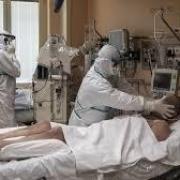 Workers across the globe have been called upon not to despair as a result of the ravaging coronavirus pandemic.
Workers across the globe have been called upon not to despair as a result of the ravaging coronavirus pandemic.This call was made by the All Workers Convergence(AWC) through its National Coordinator, Comrade Andrew Emelieze.
‘’Workers allover the world are urged by the AWC not to despair in the face of the global corona virus pandemic, nothing is permanent, we shall overcome. The coronavirus pandemic is not an exception, we shall overcome’’, Comrade Emelieze concluded.
-
Coronavirus-Govt should Enforce the Use of Face masks-Eze(Dr.)Anozie
- By solomon2day
- On 25/04/2020
- In News
 Federal and state Governments in Nigeria have been advised to enforce the use of face masks as a step towards curtailing the spread of the coronavirus pandemic.
Federal and state Governments in Nigeria have been advised to enforce the use of face masks as a step towards curtailing the spread of the coronavirus pandemic.This advise was given by the Ezendigbo of Ibadan and Oyo state, Eze(Dr.) Alex Anozie.
‘’My advice to the Federal and state Governments towards our battle against Coronavirus is that Government should make the use of face masks compulsory and automatic throughout the nation for the next one month. Also, Government should relax the lock down a bit to enable Nigerians fetch their daily bread, but they must put on face masks. Everybody, Okada riders, taxi drivers, Journalists and everybody who is coming out from his or her home to the public must put on face mask for the next one month. In addition all barbing and hair dressing salons must remain closed for now. Anybody seen on the streets without face mask should be arrested, prosecuted and made to pay a fine’’.
‘’However, banks and all health institutions must remain functional, and the workers concerned must put on face masks. Social distancing should continue including hand washing and sanitizing the hands. With all these in place, I am sure that we shall win the war against coronavirus. In addition, Government should hasten the process of providing palliatives for the people. After one month, Government should sincerely, review the present situation based on reliable information across the country’’, Eze(Dr.) Anozie stated.
-
Action Program – How the Poor Will Survive Covid-19
- By solomon2day
- On 07/04/2020
- In Special Report
Covid-19 or the Corona virus is turning the world upside down. Theresponse from the corrupt elite is for a lockdown until the virus goes away,but it could be 12-18 months before a vaccine is developed and distributed.Who can survive at home for that long? The priorities for the poor majorityremain the same – how to obtain food, water and housing for their familiesand friends. We also need electricity and data to stay in touch with ourfriends, families and colleagues. We need mass testing and tracing ofcontacts to contain the virus and free healthcare for all with protectiveequipment for all health workers. We are however amazed that the WorldHealth Organisation has not recommended the Cuban drug, Interferon 2B,for the treatment of COVID-19 pandemic. It has so far proved to be themost effective drug in combating the virus. It is one of the drugs approvedby the Chinese Government in containing COVID-19 pandemic.We need the power of the NLC/TUC to push for this Action Program. Thatwill ensure that the poor majority of Nigerians do not suffer so much from adisease that was brought here by the corrupt elite flying in from London,Paris, New York and other places.We have a particular duty to safeguard those who are most vulnerable,those who are already living with hunger, weakened immune systems andpoor access to healthcare. Greater restrictions and shutdowns may benecessary, but they will only work if full support is provided to working-class and poor communities. Comprehensive measures are needed if we areto avoid disaster. Each of us must act now with our workmates and in ourcommunities. In a society as unequal as ours, we must work together toensure that all safety measures are shared equitably.Income security for allIn order for people to remain at home, there must be income security forall. Government and private sector employers must continue to pay salariesor grant sick leave. All retrenchments should be stopped during this time.Self-employed, informal workers and those whose income is suspended atthis time must be supported by the government with cash grants. This is toprevent movement by job-seekers and to stop people having to take thevirus back to their villages.Social protection must be extended to ensure the direct transfer of cash tohouseholds during this precarious time (with clear safeguards to minimisecorruption). All defaults on rent, electricity and debt repayments shouldnot result in penalties or sanctions. All evictions and electricity or water cutoffs must be banned. A bold economic stimulus package will be required inthe coming period. These measures must be developed in consultation withthe NLC/TUC and other trade unions.All households, residential institutions, the homeless and theinformally housed must have easy access to water, safe washingfacilities and sanitationThere must be an immediate mass-provision of safe water access pointswith unconstrained flow in areas where there is limited household access towater. We also need mass-distribution of safe washing facilities incommunity housing areas. All of these sanitation points must have accessto free soap and information on the prevention of the virus. Wherenecessary governments should provide tankers with safe drinking waterand to remove sewage.All households, residential institutions, the homeless and theinformally housed must have access to foodIf we are to stay at home during this time, access to nutritious food isfundamental. The absence of the School Feeding Programme due to theclosure of schools will hit many children and their families hard. Acoordinated and safe roll-out of free food packages directly to distributionpoints in food-stressed neighbourhoods must be implemented – as hasbeen suggested by the Federal Minister of Humanitarian Affairs and forLagos State. Schools could distribute food parcels to their registeredpupils. The poor and vulnerable, elderly, refugees, IDPs, persons living withdisabilities, trafficked persons and petty traders should all be included.Essential private facilities must be appropriated for public use toprovide a unified and fair distribution of essential goods andservices to allFederal and state resources need to be focused and deployed in order tocombat the epidemic. Essential services – health centres, food services,water and sanitation etc – should be identified for urgent support andextension. This may require the conversion of factories and other places ofproduction to produce protective clothing, water tanks, soap, food parcels,ventilators and other essential medical equipment. The public and privatehealth systems need to be regarded as one health system and coordinatedin the national and public interest. This may require private facilities beingtaken over by the state, as happened in Spain. Finances may have to bemobilised through unconventional means. The rich may have to pay highertaxes and empty homes may have to be used to home the homeless or over-crowded. Regulations to stop price hikes should be implemented.There are hundreds of thousands of unoccupied houses and otherbuildings. Internally displaced people (IDP) and homeless people should beresettled in these buildings. They should also be made available for peopleliving in over-crowded accommodation.Most prisoners should be released. All the cases that have been delayedmust be hurriedly addressed. All prisoners on remand before their trial tobe released – they are innocent until proved guilty.Community self-organisation and local action is critical, as it ourrepresentation in national coordinationCivic organisations, community structures, trade unions and faith-basedorganisations will be extremely important in organising on the groundduring this emergency. We must all take action where we are. Local tradeunion structures must be engaged, supported and given representation onstate and Federal planning bodies. The distribution of reliable information,essential services and care for our people will require a massive coordinatedeffort from trade union and community leaders. Volunteers must be trainedand organised for safe, coordinated, campaigns at street-level and for thoseliving in institutions. Middle-class and wealthy communities andorganisations have an obligation to make resources available to poor andworking-class communities.We must identify strategies to calm tensions and divert violencein our homesCorona virus mainly kills the old and the ill. The death rate for those withthe disease is probably around one in 500. We do not need to panic. Buthome-based quarantine will escalate family and relationship tensions, andmay likely lead to more violence against women, children and others mostmarginalised in our families and communities including non-indigenes andforeign nationals. We need to identify strategies to calm tensions and divertviolence in our homes and communities over this time. We need a strongeducation campaign against all forms of violence, especially domesticviolence. We need to strengthen safe responses from existingneighbourhood, regional and national organisations supporting women andchildren.We also need to ensure that existing ethnic and region tensions areaddressed and minimised. It is all too easy to blame the foreigners andnon-indigenes but we all need to work together to address this crisis.Communication must be free, open and democratisedThere must be an immediate distribution of free phone data to all, so thatpeople are able to receive good information, contact loved ones duringisolation and quarantine, and understand the measures that are in place tocreate safety. Access to the best international research should be free andpublic. There must be daily national press conferences from governmentleaders alongside scientists and professionals who can keep all of ourpeople informed about the emerging situation.The inequalities within our educational services need to becarefully considered, and mitigated, when moving to remotelearningData and free website content must be made widely available byeducational institutions for continued learning. However, there is massiveinequality of access to resources such as computers, electricity, wi-fi andlearning space, as well as difficult home situations that disproportionatelyaffect poor and working-class learners, students and educators. The moveto online learning should be made carefully, and as a temporary measure.We should not extend the inequalities in the education system by affordingremote education to the few. Schools and universities should consider theircollective role as community educators and developers facing anunprecedented shared experience. Schools, residences and dormitoriesshould be understood as a public resource during this time, including forthe safe distribution of food and other essential services interrupted byschool closures.We must prevent a nationalist, authoritarian and security-focused approach in containing the virus.We must guard against the quick deployment of the military and police thatmay create insecurity in our communities and would spread the demandingof bribes. We must also prevent creating scapegoats to blame for thecurrent crisis. Instead, we must ensure that care and resources are providedfor the safety and protection of all who live in our country and in ourcommunities.How each of us responds to the Covid-19 pandemic will determine who weare as a society. The better we respond now, the better we will be after thepandemic. We must follow international best practice and the science thatwe have available to us to build an assertive response that works for thecontext of our own history and society. Our response must be just,equitable, and redistributive if we are to meet the needs of all our people. Intimes of physical distancing, social solidarity is key.This Action Programme is being supported by the followingorganisations and individuals:African Action Congress (AAC)African Centre for Media and Information Literacy (AFRICMIL)Air Transport Services Senior Staff Association Of Nigeria (ATSSSAN)All Workers ConvergenceAutomobile, Boatyards, Transport Equipment and Allied Senior StaffAssociation (AUTOBATE)Center for Awareness Reorientation and Empowerment (CARE), AfricaCentre for Human Rights and Social Advancement (CEFSAN)Centre for Labour StudiesCivil Liberties Organization ( CLO) Bayelsa State ChapterCivil Rights Council (CRC).Civil Society Legislative Advocacy Centre (CISLAC)/ TransparencyInternational in NigeriaCommittee for the Defence of Human Rights (CDHR)Femi Falana, SANGreen Peoples Environmental Network (GREPNET)HipCity Innovation Centre (HipCity Hub)Human Rights Agenda NetworkJournalists for Democratic Rights (JODER)Legal Defence and Assistance Project (LEDAP)National Conscience Party (NCP)Nigerian Human Rights Community (NHRC)Nigeria Union of Local Government Employees (NULGE), Oyo StateChapterPegarsus-Zion Community and Environmental HealthPeoples' Alternative Front (PAF)Social Accountability & Environmental Sustainability InitiativeUnited Action for Democracy (UAD), Kano -
The Urgent Need for Sound Health shall Determine the Voting Pattern of Nigerians in Future Elections-Prof. Olagoke
- By solomon2day
- On 17/12/2019
- In News
 The unfortunate happenings in the health sector has become a source of concern for every Nigerian, access to basic health care is now almost an impossibility, this is in addition to the proliferation of fake drugs and the increasing rate of quackery in the sector. In this interview, the Founder, Spiritual Head and Grand Imam of Shafaudeen-in Islam Worldwide, Prof. Sabitu Olagoke opines that the need for sound health is one of the major factors that would determine the voting pattern of Nigerians in Future Elections.
The unfortunate happenings in the health sector has become a source of concern for every Nigerian, access to basic health care is now almost an impossibility, this is in addition to the proliferation of fake drugs and the increasing rate of quackery in the sector. In this interview, the Founder, Spiritual Head and Grand Imam of Shafaudeen-in Islam Worldwide, Prof. Sabitu Olagoke opines that the need for sound health is one of the major factors that would determine the voting pattern of Nigerians in Future Elections.The health sector is in a very bad state, and there is the issue of the proliferation of fake drugs to contend with in addition to the unabating rate of quackery in the sector, all these combined makes it difficult for Nigerians to access basic health care delivery service. What do you think can be done to salvage the situation ?
Of all the fundamental essence for the survival of human beings the health sector takes an important position. Besides the provision of food, clothing and shelter, upon which the health of everybody depends to be sustained. Unfortunately, Nigeria is short of all these physiological needs demanding the urgent need to visit health care centers and hospitals regularly.
The dire need for sound health is one of the major factors that would ever propel the people to vote and give their mandate to those who will rule them in future elections.
Government service on provision of basic amenities and functional infrastructure that are adequate to serve the overwhelming population of over 200 million are yet to be achieved.
The question arising from this ought to have been a very good guide for government. Such questions should include :
Against the backdrop of the world’s standard rating of personnel/people to serve ratio, what is the position of Nigeria ?
Considering the Number of certified hospitals in the country based on state by state account and ward by ward record, what is the record and where is the evidence ? If they exist , what is their status ? In terms of structure, personnel , drugs and percentage efficiency.
All these data are expected to be on government lines of action for effective and adequate planning.
Against the backdrop of the World Health Organization(WHO) stipulations, how far has Nigeria fared ? For example, the WHO stipulates 15 per cent minimum benchmark of the annual national budget on the health sector but Nigeria sways between 3.95 per cent and 4 per cent.
This may be the reason why Government personnel and those who belong to the elite class in Nigeria, have had cause to run abroad for mere ailments which ought to have been attended to in Nigeria.
This is another reason why many Nigerians prefer to avoid hospitals in the country, until the ailments afflicting them becomes uncontrollable and unmanageable, which could eventually result in permanent infirmity or sudden death.
This may be the major reason why most health professionals seek to work abroad, where the environment is conducive.
The most worrisome aspect of the health sector challenge is the emergence of unregulated and not certified health establishments.
The general challenge for the nation, is therefore that of lack of quality healthcare from those certified government establishments and those supposed to be certified in the private sector.
Government at all levels, therefore need to be challenged on when Nigerians would begin to have adequate number of hospitals, with sufficient number of health professionals and the right type of equipment to treat various health conditions. Nigerians should be conscious of the fact that every profession has its code of conduct, ethics and rules and regulations.
To this extent, Government regulations and controls would only become effective, when we all stand by the concept of zero tolerance for corruption and institutional indiscipline which by right extends to the wholesome rejection of fake drugs and quackery. Let the whole country wake up from the long slumber.
-
MSF calls for Assistance to curb Measles Epidemic in DRC
- By solomon2day
- On 13/06/2019
- In News
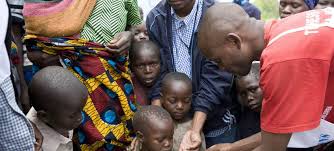 Médecins Sans Frontières (MSF) has called on called on local and international organizations to assist in the combating of a measles epidemic currently ravaging the Democratic Republic of Congo(DRC).
Médecins Sans Frontières (MSF) has called on called on local and international organizations to assist in the combating of a measles epidemic currently ravaging the Democratic Republic of Congo(DRC).MSF made this call through its Medical Coordinator in DRC, Rachel Séguin,''MSF teams, in collaboration with the teams of the Ministry of Health, are doing their utmost to cut the chain of transmission of the disease by providing vaccination responses as soon as cases of measles are reported, and by providing care for patients.''
"But in addition to the efforts already made in recent months, more resources and organisations are needed. Ensuring the supply of vaccines and medicines is essential - the sooner the better."
The Ministry of Health in DRC, recently declared an out break of the disease which has officially recorded more than 1,500 measles-related deaths in the first five months of this year.
This accounts for 75 per cent of the total number of deaths recorded throughout 2012 during the deadliest epidemic of the last decade.
Since January, MSF has been working with local teams of the Ministry of Health in 10 provinces of the country: Haut-Lomami, Haut-Uele, Ituri, Lualaba, Kasai, Kasai Central, North Kivu, South Kivu, Tanganyika and Tshopo, to combat the measles epidemic. -
Laboratory Services Are Crucial in Addressing Health Issues-Uganda Health Minister
- By solomon2day
- On 04/04/2019
The Minister of Health in Uganda, Dr. Ruth Aceng has emphasized the importance of laboratories in addressing health issues.
Dr. Aceng made this position known on Wednesday during the dissemination of the Ministry's Laboratorya policy at its headquarters in Kampala.
''Laboratory services play a critical role in diseases prevention and effective survveillance laboratory systems help detect early, thereby massive outbreaks and in the case of outbreaks , to facilitate effective management'', Dr. Aceng stated.
-
Health Care Delivery Services not Adequate to Cater for Nigerians-Prof. Olagoke
- By solomon2day
- On 01/04/2019
- In News
 Millions of Nigerians experience great difficulties accessing quality health care. This is as result of corruption and rot in the system.
Millions of Nigerians experience great difficulties accessing quality health care. This is as result of corruption and rot in the system.Inadequate funding, shortage of qualified personnel and non- availability of modern equipment are just a few of the several challenges affecting the health sector.
In this interview, the Founder, Spiritual Head and Grand Imam of Shafaudeen-in-Islam Wordlwide, Prof. Sabitu Olagoke says government needs to do more for the people to access quality health care services. Excerpts :
What do you think the government at all levels can do to address the myriad of challenges of the health sector ?
First and foremost health care delivery falls into three categories, the primary, secondary and tertiary.
The Local Government is saddled with the responsibility of ensuring that primary health care gets to the people at the grassroots. Expected services involve the traditional birth methods by licensed Mid-Wives with operational hours from 8.00 am to 4.00 pm.
At the advanced level, a comprehensive health care center which is supposed to have at least one Medical Doctor, who can perform at least cases of minor surgery. At this level, referrals are usually made.
At the state level, the secondary health care represents the curative management of peoples’ health, while at the federal level, there is the tertiary health care delivery, which focuses on rehabilitation, cases are referred to this level of medical services.
All the three categories need to co-exist because health challenges vary in degree and does not respect the status of anybody in society.
However, there are challenges weighing down the three health care delivery systems. Firstly, the services are not adequate to cater for the population and geographical spread.
Also, there are the challenges of proximity, shortage of staff and drugs.
Assessment and affordability are also setbacks.
The areas that need them most are grossly neglected, that is the rural areas.
Government needs to understand that shortages result in peoples’ untimely death.
For the primary health care to be effective in serving the people, the following areas must be given adequate attention-health education, availability of sufficient drinking water, immunization, treatment of communicable and non-communicable diseases through the use of standing order, provision of essential drugs. For example, the timely treatment of health challenges using Oral Polio Vaccines(OPV) at preventive measure level.
It is imperative for government to make proviso for adequate medical services with these characteristics-management, availability, accessibility, affordability, proximity to the users, scientifically based with attendant quality and standard of World Health Organization, socially acceptable, even when it needs cost effectiveness and the use of locally available resources.
In several hospitals, grass roots level and otherwise, services are poor and government is yet to come out with policies which are people friendly.
For example, at the local level, hospitals are needed, which would be accessible to people and there would be satisfactory service delivery.
Medical centers or hospitals are supposed to have conducive environment, with good hygiene and quality facilities. Also health workers should not be in short supply and drugs should be sufficient enough to treat ailments.
Government should realize that of all the needs of man, health management cuts across the three physiological needs. Food administration that would not lead to health problems.
Clothing culture that would prevent another health challenge that may arise from extreme weather situations, while provision should be made for shelter in ways that would not result in negative health conditions.
The incoming government therefore, need to allow all professionals to practice in line with professional ethics without political interference, so that they would be able to contribute positively. The recruitment of suitably qualified personnel is highly essential in this respect.
Government must take to their professional advice and recommendations, on ideas that can make their services reach the appropriate target and goals, with the people in focus.
When the welfare of the people is addressed with all seriousness by government, productivity at work would be enhanced with dramatic efficiency for government programs to be appreciated.
Statistics of the population, based on the enumeration of the houses with specified geographical locations, wards or local governments must be addressed, to enable government know the actual number of primary health care centers and if there is need to establish more.
Peoples’ feelings on the services of the primary health care centers near them must be taken with all seriousness by government, as a a step towards addressing shortages in terms of drugs and staff, including the ethical practices assessment needs to normalize services as required by the World Health Organization.
-
Three Ghanaian Schools Seek Financial Assistance
- By solomon2day
- On 09/01/2019
- In News
 An appeal has been made by three junior high schools in the Gyabankrom Circuit of Abura-Asebu- Kwamankese District in the Central Region of Cape Coast Ghana for financial assistance for school infrastructure upgrade.The school which include, Afrangua D/A Basic School, Mpeseduadze Bob Beadle JHS and Betsingua D/A Basic School lack toilets, potable water, Information, Communication and Technology (ICT) centre in addition to the school buildings which are in a deplorable state.
An appeal has been made by three junior high schools in the Gyabankrom Circuit of Abura-Asebu- Kwamankese District in the Central Region of Cape Coast Ghana for financial assistance for school infrastructure upgrade.The school which include, Afrangua D/A Basic School, Mpeseduadze Bob Beadle JHS and Betsingua D/A Basic School lack toilets, potable water, Information, Communication and Technology (ICT) centre in addition to the school buildings which are in a deplorable state.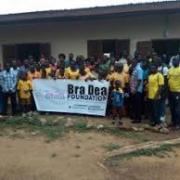 Mr Joseph Appiah, the head teacher of Mpeseduadze Bob Beadle JHS, lamented that some RLG laptop computers donated to the schools about 10 years ago to enhance teaching and learning of ICT were faulty and had not been repaired for the past three years.
Mr Joseph Appiah, the head teacher of Mpeseduadze Bob Beadle JHS, lamented that some RLG laptop computers donated to the schools about 10 years ago to enhance teaching and learning of ICT were faulty and had not been repaired for the past three years."Most of the laptops we are using were all supplied by government but they are not working and teachers find it difficult in teaching the practical aspect of the ICT," Mr. Appiah stated.
-
Cholera Outbreak in Yobe state Nigeria
- By solomon2day
- On 22/09/2018
- In Pictures


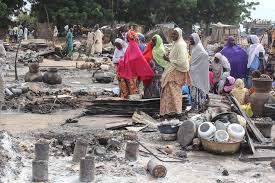
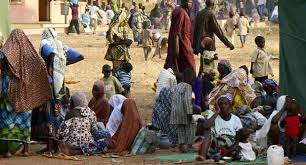
Cholera has claimed the lives of 61 persons in Yobe state, Nigeria, while the state government disclosed that there are 906 fresh cases.
However, the Federal Government is yet to intervene to save the situation. Other states in Nigeria are now apprehensive.
